São Paulo’s many informal workers, like those in the rest of Brazil, have reacted to COVID-19 with impressive speed and agility. As demand for products like masks, gloves, and sanitiser has soared, small-scale production has been ramped up and new solutions have been found for logistics and marketing. But ultimately the mother of this invention is dire necessity, and the confused and contradictory response of the Brazilian state has done little to mitigate the precarious conditions that informal workers face day-to-day, write Kauê Lopes dos Santos (University of Sao Paulo & LSE Latin America and Caribbean Centre), Jonatas Santos (University of Sao Paulo), and Larissa Santos (University of British Columbia).
In Latin America as elsewhere in the Global South, there is nothing unusual about a crisis reinforcing the dynamic character of informal economies. When certain markets decline and become unprofitable, thousands of urban workers are forced to reinvent themselves, and especially those that are self-employed. In the case of COVID-19, this is nowhere clearer than in Brazil’s biggest city, São Paulo.
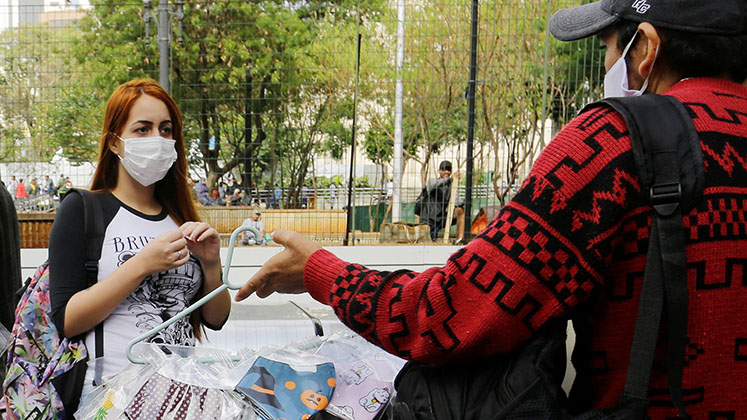
COVID-19 and informal entrepreneurialism
Fernanda is a professional make-up artist, chemical technician, and microentrepreneur who established her own brand of cosmetics eight years ago. Until February 2020, she offered makeup workshops and sold her products in a church in the Campo Grande neighbourhood in southern São Paulo, where she has lived for roughly ten years. Then COVID-19 struck.
Events were cancelled, churches were closed due to social distancing, and makeup ceased to be a top priority for many people. The prospect of serious money problems became increasingly concrete for many families, including Fernanda’s own. Living with her partner and her newborn daughter on the edge of Brazil’s largest metropolis, the monthly “coronavoucher” for informal workers (BRL $600, or around £87) covers barely a third of the costs incurred by a family of three like hers. The only option is to adapt.
Facing a string of cancelled weddings, events, and orders, Fernanda added a new product to her range and to her marketing: hand sanitiser. During the first few weeks of the pandemic, high demand for this product saw its price rise by as much as 590 per cent. Acting fast, this young entrepreneur began small-scale production at home, using social media like Facebook and Instagram to advertise her new product with the option of home delivery around southern São Paulo.
Across town in the northern neighbourhood of Brasilândia, a longstanding resident and seamstress called Célia has also added a new product to her range. Before the pandemic, she worked mainly repairing and altering items of clothing, but as new demand emerged she began instead to produce face masks at home with the help of her two daughters, again using social media to find new markets. But although demand has been sky high, she has no idea how long it will last, and that makes investment decisions more complicated:
I am buying fabrics, and we are taking turns at the sewing machine. If I knew how long this would last, I could buy another machine as well, but I don’t think it’s worth the investment at the moment.
The kind of innovation we see from Fernanda and Célia is typical of informal workers across Brazil. The manufacture and trade of products like alcohol gel, face masks, and gloves has grown suddenly and rapidly in response to demand stimulated by the coronavirus, with small producers of household cleaning products and herbal medicines also expanding production. Guidelines on hygiene and social distancing have also led to the emergence of new marketing and logistical regimes, with social networks and delivery apps playing a central role in the sale and provision of products from the informal economy, especially in large urban centres.
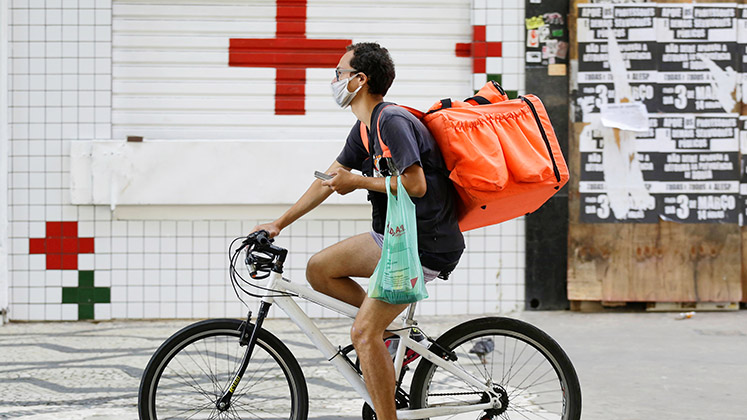
The mother of invention
But although this can be spun as a story of dynamism, innovation, and entrepreneurialism, it is vital to remember that stories like those of Fernanda and Célia are set against a backdrop of socio-economic crisis. In May, unemployment rose to 12.2 per cent, with around 40 per cent of workers employed in the informal sector. Having recently developed a method to assess the vulnerability of formal and informal workers, a group of researchers from several universities and research institutes found that more than 50 million Brazilians are vulnerable due to their employment status.
The progression of the pandemic and the socio-economic outlook are even more problematic given the country’s ongoing political crisis. Brazil’s federal system allows governors to adopt specific public health and safety policies to combat COVID-19, but a lack of coordination between the executive and governors has made containment policies inefficient and led to much confusion around social distancing. President Jair Bolsonaro in particular has muddied the waters through clashes with scientific authorities at home and abroad, and the country has been without a health minister since Nelson Teich became the second of two quickfire resignations in mid-May.
The result is that Brazil has become one of the epicentres of the pandemic. At the time of writing, Brazil has the second-highest number of confirmed cases (at around 1.2 million) as well as the second highest death toll (at 54,000). Different states have been hit differently, but poor urban areas have proven to be the most vulnerable of all.
Home to more than 21 million inhabitants, the Metropolitan Region of São Paulo is a hotbed of the virus in the country, with adherence to social isolation last month falling below below 50 per cent. The risk of a rise in infections and the collapse of the health system – already underway in states like Amazonas, Pará, and Rio de Janeiro – does not seem to trouble groups that are pushing for a reopening of the economy.
But this political uncertainty and fluctuating adherence to social distancing represents a volatile situation for informal workers trying to reinvent themselves in the face of the pandemic, with no clear stability in terms of the demand that circumstances have forced them to address. Aside from its serious public health implications, a more coherent strategy and message across levels of government in Brazil would help vulnerable informal workers to make better choices about where to dedicate their energies and investment.
Notes:
• The views expressed here are of the authors rather than the Centre or the LSE
• Please read our Comments Policy before commenting


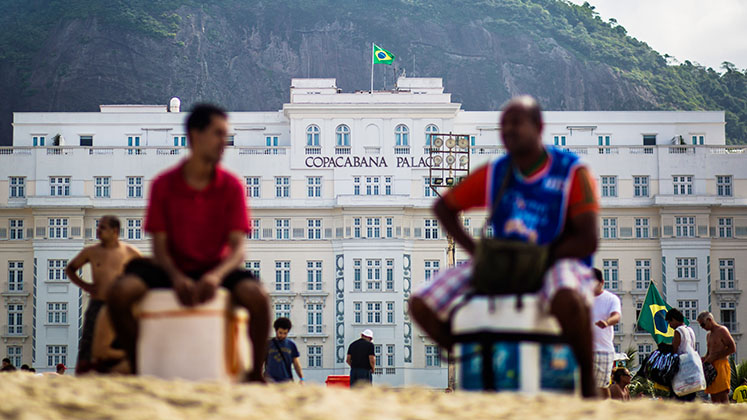
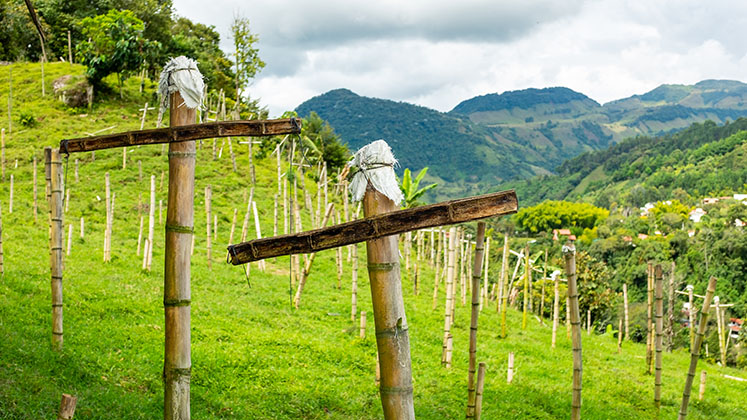
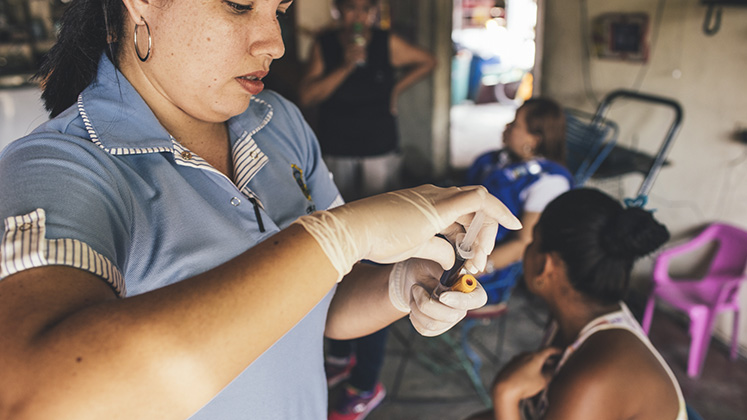
When people have no option, they always manage to make money. Unfortunately not everyone can stay at home in this pandemic …